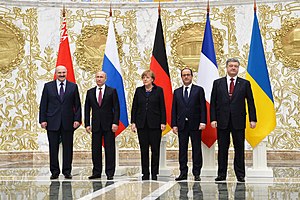MINSK Agreements:

The United States has warned Russia not to invade Ukraine and urged both countries to return to a set of agreements designed to end a separatist war by Russian-speakers in eastern Ukraine. Here is a look at the agreements, which were signed in Minsk in 2014 and 2015.
MINSK I:
- It was written in September 2014 by the Trilateral Contact Group on Ukraine, i.e. Ukraine, Russia, and the Organisation for Security and Co-operation in Europe (OSCE) with mediation by France and Germany in the so-called Normandy Format.
- Ukraine and the Russian-backed separatists agreed a 12-point ceasefire deal in the capital of Belarus in September 2014.
- Its provisions included prisoner exchanges, deliveries of humanitarian aid and the withdrawal of heavy weapons, five months into a conflict that by that point had killed more than 2,600 people – a toll that has risen to more than 14,000 now, according to the Ukrainian government.
- The agreement quickly broke down, with violations by both sides.
MINSK II:
- As the rebels moved further into Ukraine, in February 2015, representatives of Russia, Ukraine, the OSCE and the leaders of Donetsk and Luhansk signed a 13-point agreement , now known as the Minsk 2 accord.
- Representatives of Russia, Ukraine, the Organisation for Security and Cooperation in Europe (OSCE) and the leaders of two pro-Russian separatist regions signed a 13-point agreement in February 2015 in Minsk.
- The leaders of France, Germany, Russia and Ukraine gathered there at the same time and issued a declaration of support for the deal.
- The deal set out a series of military and political steps that remain unimplemented.
- It also had provisions related to acknowledgement of special status by parliament, pardon and amnesty for fighters, exchange of hostages and prisoners, humanitarian aid etc.
- However, these provisions have not been implemented because of what is popularly known as the ‘Minsk Conundrum’. This essentially means that Ukraine and Russia have contradictory interpretations about the agreement.




